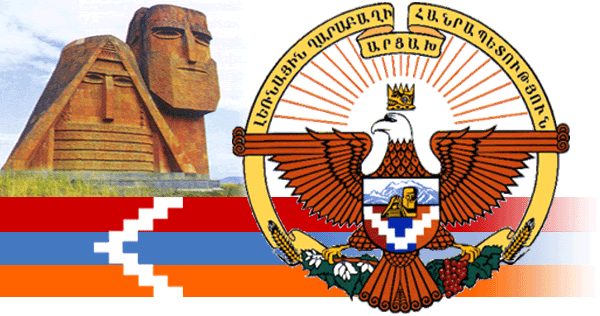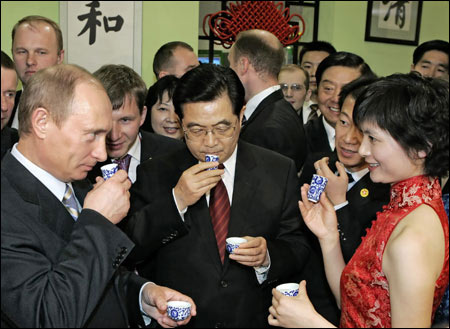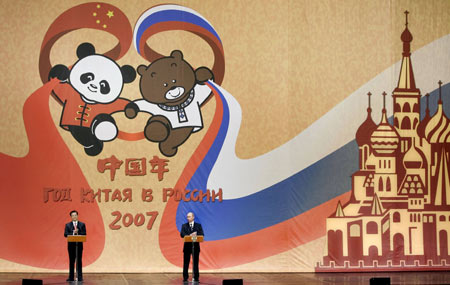Re: The Rise of the Russian Empire: Russo-Armenian Relations
Perhaps we are witnessing one of the more positive consequences of big power politics in the Caucasus region: the realization that a stable and powerful Armenia is in the interests of the superpowers. Perhaps the West realizes that a Russian-backed Armenia can potentially cause a lot of troubles in the region. What's more, it is no secret that Moscow realizes that the only way to keep Georgia, Azerbaijan and NATO in check is by keeping Yerevan close. Without doubt, this is a very delicate game. There are many variables and factors at play here. Thus far, however, it seems as if Armenia's hold on Artsakh somehow fits into the region's geopolitical formulations.
Armenian
************************************

On March 18-20 Secretary of State of the Russian Fedration Grigory Karfasin was on an official visit to Yerevan. On a yesterday press-conference at Armenia-Marriott Hotel Karasin informed the reporters that he had meetings with the President, Prime Minister and Foreign Minister of Armenia. From a number of issues discussed on the meetings, the Russian Secretary of State pointed out the question of Armenia-Russia cooperation, which is steadily developing in the spheres of politics, culture and education. He stated that Armenia and Russia remain allies and that Russia pays equal attention to all formats of partnership with Armenia.
Another important topic discussed on Karasin’s meetings with the top highest officials of Armenia, were the events succeeding the presidential elections of February 19. "Russia is by no means indifferent towards the development of inner political situation in an allied state. We take for granted that any political problem must be settled through dialogue and in accordance with the Law, and that disturbances and chaos in the streets are harmful for any state. I am sure that the March 1-2 events showed the Armenian citizens, how dangerous that path can be. It cannot lead to any solution, but bring the country to instability and discouragement," assured Grigory Karasin.
To Karasin’s opinion, both the President and the Prime Minister of Armenia perfectly realize the situation and are able to control it, as well as they have distinct plans of involving the constructive opposition in the legal processes. The Russian representative expressed hope that due to this notions Armenia shall soon return to stability and predictability. Karasin also suggested that the Armenian statehood has already passed through that perilous period and is heading towards the times of political reforms and dialogue. Referring to the peace process on Nagorno-Karabakh and the armistice break in March, Karasin said that there is still progress and emphasized that due to the efforts of both the conflicting sides and the interference of the Minsk Group, meetings of the Presidents of Armenia and Azerbaijan are regularly held, unlike other conflicts in the post-Soviet area. "We were disturbed by the incident on the frontline in early March. It is pleasure that it was localized and by efforts from both the sides," Karasin said.
He also remained that the Co-Chairs of the OSCE Minsk Group were against the Resolution, passed by Azerbaijan in the UN General Assembly. "Such rapid initiatives in international structures, moreover as influential as the UN, can hardly have any positive results, what was fairly proved with the voting," added the Secretary of State. He said he hopes that the peace process on Karabakh shall keep on going in the same format, the Minsk Group intermediation, and that an intergovernmental Armenia-Azerbaijan meeting shall be organized. The Russian official explained that he decided not to meet with opposition representatives, as the information provided by the President, Prime Minister and Foreign Minister was quite sufficient. "We know, what they think in the opposition camp. We have an embassy here, and friends, in all the spheres of political and social life. No need to doubt whether we possess all necessary information or no," he concluded.
Source: http://www.azg.am/EN/2008032101
Recognition of Nagorno Karabakh’s independence doesn’t conflict with international interests, NKR former Deputy Foreign Minister Arman Melikyan said. “We can initiate the recognition process. I am confident that recognition of Nagrono Karabakh by Armenia will cause chain reaction,” he said. “Russia and U.S. are not interested in return of territories to Azerbaijan. It’s not in our interests either. We should grant Karabakhi citizenship to Armenian refugees from Azerbaijan, who can populate these lands,” he said. “The negotiation process meets the interests of the EU, which a rival for the United States in the issue. However, weakening of the U.S. influence in the region will not affect the situation, since Russia and U.S. coincide on Karabakh,” Melikyan said, Novosti Armenia reports.
Source: http://www.panarmenian.net/news/eng/?nid=25454

If Baku continues implementing its current policy, Yerevan will respond by recognition of the Nagorno-Karabakh Republic and sign with it agreements, particularly, in the defense field. Acting president of Armenia Robert Kocharyan made the statement while talking to journalists on March 20. REGNUM correspondent quotes Kocharyan to say that present activity of Azerbaijan in international organizations is due to the Kosovo problem. In particular, Azerbaijan is aiming to create a balance to the Kosovo precedent and demonstrate that Kosovo cannot be a precedent for Karabakh. “The NKR has more rights for independence than Kosovo,” Kocharyan stressed, detailing that Karabakh, among other accomplishments, has state organizations, independently guards its borders, and has earlier than Kosovo started the process of gaining independence. Speaking of the Baku's initiative to dissolve the OSCE Minsk Group, the Armenia's head of state has said the group is the best existing peace and negotiation-facilitating format, as for the moment. “If the Azerbaijani side is not happy with the format, it does not mean that we have to destroy it. If they do not want to negotiate, they are free not to do it,” the Armenian head of state noted. He has added that Baku should rather think of the future and of who will be responsible for the further developments, if its scenario is chosen.
Source: http://www.regnum.ru/english/974134.html
Perhaps we are witnessing one of the more positive consequences of big power politics in the Caucasus region: the realization that a stable and powerful Armenia is in the interests of the superpowers. Perhaps the West realizes that a Russian-backed Armenia can potentially cause a lot of troubles in the region. What's more, it is no secret that Moscow realizes that the only way to keep Georgia, Azerbaijan and NATO in check is by keeping Yerevan close. Without doubt, this is a very delicate game. There are many variables and factors at play here. Thus far, however, it seems as if Armenia's hold on Artsakh somehow fits into the region's geopolitical formulations.
Armenian
************************************
RUSSIA SUPPORTS THE STABILITY OF ARMENIAN

Karasin Hopes for Minsk Group Format to be Preserved
On March 18-20 Secretary of State of the Russian Fedration Grigory Karfasin was on an official visit to Yerevan. On a yesterday press-conference at Armenia-Marriott Hotel Karasin informed the reporters that he had meetings with the President, Prime Minister and Foreign Minister of Armenia. From a number of issues discussed on the meetings, the Russian Secretary of State pointed out the question of Armenia-Russia cooperation, which is steadily developing in the spheres of politics, culture and education. He stated that Armenia and Russia remain allies and that Russia pays equal attention to all formats of partnership with Armenia.
Another important topic discussed on Karasin’s meetings with the top highest officials of Armenia, were the events succeeding the presidential elections of February 19. "Russia is by no means indifferent towards the development of inner political situation in an allied state. We take for granted that any political problem must be settled through dialogue and in accordance with the Law, and that disturbances and chaos in the streets are harmful for any state. I am sure that the March 1-2 events showed the Armenian citizens, how dangerous that path can be. It cannot lead to any solution, but bring the country to instability and discouragement," assured Grigory Karasin.
To Karasin’s opinion, both the President and the Prime Minister of Armenia perfectly realize the situation and are able to control it, as well as they have distinct plans of involving the constructive opposition in the legal processes. The Russian representative expressed hope that due to this notions Armenia shall soon return to stability and predictability. Karasin also suggested that the Armenian statehood has already passed through that perilous period and is heading towards the times of political reforms and dialogue. Referring to the peace process on Nagorno-Karabakh and the armistice break in March, Karasin said that there is still progress and emphasized that due to the efforts of both the conflicting sides and the interference of the Minsk Group, meetings of the Presidents of Armenia and Azerbaijan are regularly held, unlike other conflicts in the post-Soviet area. "We were disturbed by the incident on the frontline in early March. It is pleasure that it was localized and by efforts from both the sides," Karasin said.
He also remained that the Co-Chairs of the OSCE Minsk Group were against the Resolution, passed by Azerbaijan in the UN General Assembly. "Such rapid initiatives in international structures, moreover as influential as the UN, can hardly have any positive results, what was fairly proved with the voting," added the Secretary of State. He said he hopes that the peace process on Karabakh shall keep on going in the same format, the Minsk Group intermediation, and that an intergovernmental Armenia-Azerbaijan meeting shall be organized. The Russian official explained that he decided not to meet with opposition representatives, as the information provided by the President, Prime Minister and Foreign Minister was quite sufficient. "We know, what they think in the opposition camp. We have an embassy here, and friends, in all the spheres of political and social life. No need to doubt whether we possess all necessary information or no," he concluded.
Source: http://www.azg.am/EN/2008032101
Russia and U.S. not interested in return of territories to Azerbaijan


Recognition of Nagorno Karabakh’s independence doesn’t conflict with international interests, NKR former Deputy Foreign Minister Arman Melikyan said. “We can initiate the recognition process. I am confident that recognition of Nagrono Karabakh by Armenia will cause chain reaction,” he said. “Russia and U.S. are not interested in return of territories to Azerbaijan. It’s not in our interests either. We should grant Karabakhi citizenship to Armenian refugees from Azerbaijan, who can populate these lands,” he said. “The negotiation process meets the interests of the EU, which a rival for the United States in the issue. However, weakening of the U.S. influence in the region will not affect the situation, since Russia and U.S. coincide on Karabakh,” Melikyan said, Novosti Armenia reports.
Source: http://www.panarmenian.net/news/eng/?nid=25454
Robert Kocharyan: Armenia may recognize Nagorno-Karabakh

If Baku continues implementing its current policy, Yerevan will respond by recognition of the Nagorno-Karabakh Republic and sign with it agreements, particularly, in the defense field. Acting president of Armenia Robert Kocharyan made the statement while talking to journalists on March 20. REGNUM correspondent quotes Kocharyan to say that present activity of Azerbaijan in international organizations is due to the Kosovo problem. In particular, Azerbaijan is aiming to create a balance to the Kosovo precedent and demonstrate that Kosovo cannot be a precedent for Karabakh. “The NKR has more rights for independence than Kosovo,” Kocharyan stressed, detailing that Karabakh, among other accomplishments, has state organizations, independently guards its borders, and has earlier than Kosovo started the process of gaining independence. Speaking of the Baku's initiative to dissolve the OSCE Minsk Group, the Armenia's head of state has said the group is the best existing peace and negotiation-facilitating format, as for the moment. “If the Azerbaijani side is not happy with the format, it does not mean that we have to destroy it. If they do not want to negotiate, they are free not to do it,” the Armenian head of state noted. He has added that Baku should rather think of the future and of who will be responsible for the further developments, if its scenario is chosen.
Source: http://www.regnum.ru/english/974134.html















Comment